#long beach palestine rally
Text

punks support Palestine. if you consider yourself a punk and don’t have a problem with what is happening in Gaza, you are not a punk. you’re just a problem. unfollow if you support the israeli government
#free palestine#long beach palestine rally#palestine rally#boycott chevron#long beach#palestine#israel
188 notes
·
View notes
Text
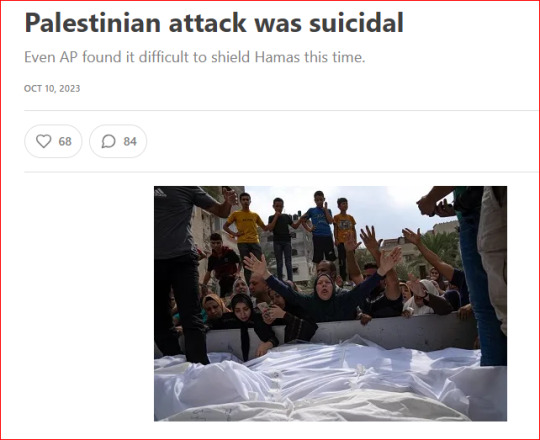
Even Biden — who gave Iran $6 billion for 5 Americans held hostage to finance this war — has had to dial back his support. There is no American call for a truce before Israel can respond. There are no calls for proportionality in response. Instead, we cheer as Israel pays back Palestine for launching thousands of rockets by launching Israeli rockets.
I have not seen Americans root this hard for Israel since the Six Day War 56 years ago. Instead of a quick call for peace after Palestinians were done attacking, Biden sent an aircraft carrier.
Yeah, well, don’t count on that lasting very long. The anti-Semites had no trouble self-identifying over the last couple of days in setting up rallies cheering the raping, pillaging, and slaughter of Israeli civilians; the rally at CSU Long Beach (my wife’s alma mater) even had an image of a paragliding jihadist as part of their celebratory poster. This war will be suicidal in another way; Gaza almost certainly won’t exist as an autonomous Palestinian settlement when the ground stops shaking. In fact, it might not be home to Palestinians at all after this, and that has some dire consequences for Palestinians in the West Bank.
2 notes
·
View notes
Text
1. Summer Solstice Indigenous Festival – June 1-21
Established in Ottawa in 1996, the Summer Solstice Indigenous Festival (SSIF) is a multi-disciplinary arts festival that brings together Indigenous artists, performers, educators, students, and community members to share knowledge and celebrate Canada’s diverse Indigenous cultures. The former 4-day live event takes place in June: coinciding with National Indigenous History Month and closing on National Indigenous Peoples Day (June 21). This year’s virtual programming includes The SSIMAs a new national Indigenous music awards program as well as Education Days, streamed performances, interactive family activities, arts and crafts, culinary and cultural workshops including the popular Pow Wow now socially distanced.
Twitter https://twitter.com/ottawasolstice/
Instagram https://www.instagram.com/solsticefestivals/
Facebook https://www.facebook.com/solsticefestivals/
YouTube https://www.youtube.com/channel/UCYnmJlZdwcGa-6nB6L4mJqA
Website: https://summersolsticefestivals.ca/
2. Stop Insuring Trans Mountain: Week of Action – June 14 – 21
Online and in-person
Join us for a week of action from June 14 – 21 targeting the insurance companies enabling the continued operation and expansion of the Trans Mountain pipeline.
𝗪𝗵𝗮𝘁’𝘀 𝗧𝗿𝗮𝗻𝘀 𝗠𝗼𝘂𝗻𝘁𝗮𝗶𝗻? The Trans Mountain expansion project would transport an additional 590,000 barrels of tar sands oil per day from Alberta to British Columbia, and lead to a 700% increase in oil tankers in the Salish Sea. Many Indigenous communities have consistently and repeatedly rejected the Trans Mountain pipeline and tanker project – but the Canadian government continues to plough ahead with construction.𝗪𝗵𝘆 𝗶𝗻𝘀𝘂𝗿𝗮𝗻𝗰𝗲? Current insurers of the pipeline are complicit in violating Indigenous rights and driving climate change through providing $500 million USD in coverage. Without insurance, the pipeline cannot keep operating, and its expansion can’t be constructed. That makes un-insuring Trans Mountain a critical way to stop the pipeline once and for all.Last year, Indigenous communities and activists pushed three insurance companies to cut ties with the pipeline: Zurich, Munich Re, and Talanx. We are not letting up the pressure.Trans Mountain is currently seeking insurers to back the project in the year to come, with a deadline of August 31. Right now we have a critical window in which to pressure insurers to rule out coverage for the pipeline and make Trans Mountain uninsurable.𝗪𝗲’𝗿𝗲 𝗰𝗮𝗹𝗹𝗶𝗻𝗴 𝗼𝗻 𝘁𝗵𝗲𝘀𝗲 𝗶𝗻𝘀𝘂𝗿𝗲𝗿𝘀 𝘁𝗼 𝗽𝘂𝗯𝗹𝗶𝗰𝗹𝘆 𝗰𝗼𝗺𝗺𝗶𝘁 𝘁𝗼 𝗱𝗿𝗼𝗽𝗽𝗶𝗻𝗴 𝗧𝗿𝗮𝗻𝘀 𝗠𝗼𝘂𝗻𝘁𝗮𝗶𝗻:
Liberty Mutual
Chubb
AIG
W.R. Berkley
Lloyd’s
Starr
Stewart Specialty Risk Underwriting
Marsh
𝗝𝗼𝗶𝗻 𝘂𝘀! We will turn up the heat on these companies during the Week of Action through protests at office locations, digital actions, and more. Find your local or virtual event below.
Stop TMX Week of Action Supporter Toolkit:
http://bit.ly/TMXToolkit
Sign up to host an action in your community here:
https://forms.gle/LrrDdu8P62bir7eM7
𝗔𝗰𝘁𝗶𝗼𝗻𝘀 𝗮𝗿𝗲 𝗵𝗮𝗽𝗽𝗲𝗻𝗶𝗻𝗴 𝗶𝗻 𝘁𝗵𝗲 𝗳𝗼𝗹𝗹𝗼𝘄𝗶𝗻𝗴 𝗰𝗶𝘁𝗶𝗲𝘀 (𝗺𝗼𝗿𝗲 𝘁𝗼 𝗰𝗼𝗺𝗲!): Berlin, Bristol, Charlotte, Denver, Eagle River, Fairbanks, Fremont, Kaneohe, Ottawa, Montreal, Portland, Seattle, Rochester, Thunder Bay, Toronto, Vancouver, Victoria
3. COVID-19, Social Safety Nets, and Sex Work in the Capital Survey – June 5 – June 30
The “COVID-19, Social Safety Nets, and Sex Work in the Capital” survey is a joint research project between University of Ottawa researchers and Prostitutes of Ottawa-Gatineau Work Educate Resist (POWER). This survey of sex workers in the capital region seeks to better understand the economic impact of COVID-19 on sex workers and how they navigated social benefit programs created in its wake. The confidential and remunerated 10-12 minute online survey will remain open thru to June 30, 2021.
For more information about the research or to take the survey, please visit https://www.powerottawa.ca/covid19
4. Protest at Ottawa CBC – Tuesday, June 22, 4:30PM
Rally Point: Sparks St. and O’Connor St.
OTTAWA!
We are calling on you to join us Tuesday June 22 at 4:30 PM at CBC offices to protest CBC’s anti-Palestinian biases and dishonest reporting on Palestine.
CBC has refused to report on the 2021 Human Rights Watch report highlighting Israeli crimes of apartheid: https://www.hrw.org/report/2021/04/27/threshold-crossed/israeli-authorities-and-crimes-apartheid-and-persecution
They have reprimanded their journalists for signing an open letter to newsrooms asking for fairer coverage of Palestine.
And they have banned the use of the word “Palestine” in their broadcasts and digital media.
We demand change!!!
NOTE: Please abide by all COVID19 guidelines and social distancing measures. See you there!
Hosted by: CBC Palestine
5. OCAP Solidarity Speaker Series: Long-Term Care – Thursday, June 24, 11AM-12:30PM
Hosted by: Ontario Coalition Against Poverty
Join us again Thursday June 24th for our Solidarity Speaker Series event. This month’s spotlight is on Long-term Care and will feature speakers from Ontario Health Coalition, the EMPOWER network, and York University. Come learn about how the government has allowed this sector to be woefully neglected with deadly consequences and what we can do to improve legislation and shift away from the for-profit model of senior care.
Who you’ll be hearing from:
Pat Armstrong, Sociology Professor, York University
Cindy Huggins, PSW, EMPOWER network
Natalie Mehra, Ontario Health Coalition
The OCAP Solidarity Speaker Series is a recurring event, taking place on the last Thursday of the month, to spotlight rad organizations and individuals and highlight ongoing issues from an anti-capitalist perspective. We aim to educate, spark dialogue, and call folx to action in diverse and meaningful ways.
Hope to see you there!
More info and event link here.
6. Learning from the Movement OGs – Thursday, June 24, 4PM-6PM
Nothing happening in this historic era of protest has come from nowhere. This two hour panel will highlight the wisdom of movement OGs who have been doing the work—and are still doing the work—of Black liberation, Indigenous anti-colonial struggle, and migrant justice struggle, which has laid out the conditions of possibility for this political moment.
Panelists: Bridget Tolley, Lynn Jones, Beverly Bain, Harsha Walia
Facilitators: Robyn Maynard, Pascale Diverlus
Sign up here
Hosted by: Building The World We Want
7. Justice for Workers Outreach at Britannia Beach – Saturday, June 26, 12PM – 2PM
Join us for this community canvass at Britannia Beach where we will be speaking out about the need for paid sick days, fair wages and decent work for all.
This will be the first Ottawa outreach action for the Justice for Workers campaign and we would love it if you came by to help us collect signatures on our new petition!
Look out for our tent and volunteer team. Make sure to dress appropriately for the weather, and don’t forget to bring water and snacks.
Sign up and check back for more details to be announced shortly.
Materials and location info at this link.
8. Stories from Insider Spaces: Exploring AGM Intervention as an Activist Tactic – Monday, June 28, 6:30PM – 8:00PM
Hosted by: Mining Injustice Solidarity Network
Registration information below!
Have you ever wished you could look the CEO of a harmful company in the face and say your piece? Want more information about a corporate project that’s impacting your community and wish you could get some answers? Come to this event and explore the strategic possibilities of Annual General Meetings (AGMs) with the Mining Injustice Solidarity Network (MISN)!
All publicly traded companies are legally required to hold Annual General Meetings (AGMs), where shareholders are able to attend, ask questions, and vote on important decisions.
This means that, once a year, companies with significant influence (including mining companies) are compelled to open up a space that is much more accessible to the public than many industry gatherings that happen behind closed doors. AGMs allow shareholders to hold company executives accountable. They can also be an important opportunity for activists and impacted communities.
AGM interventions have been an important part of MISN’s strategic toolbox . We’ve attended AGMs to take notes for impacted communities, asked questions to unmask the misleading information shared by mining companies with their shareholders, hosted rallies outside of AGMs, led disruptions inside the meetings themselves, and more. Here are some examples: https://mininginjustice.org/archive/pastprojects/spring-into-action/
During this event, MISN members and allies will share their experiences attending AGMs, outline some of the different intervention tactics that we’ve used in the past, and provide some practical information on how you can research and buy a share in a company so that you can also attend its AGM.
The format of this event will include multiple speakers, video documentation of AGM interventions, and some opportunities to engage in small group discussion with other participants.
We hope you’ll attend if you are fighting a publicly traded company or are impacted by a company and want to add one more approach to how you organize against it.
CLICK HERE TO REGISTER!: http://bit.ly/StoriesFromInside
9. Status For All March – Ottawa Rally – July 25, time tbd
In person, place tba
Join the rally in Ottawa on July 25th to welcome the arrival of the historic March for Status for All from Montreal! Across the country migrants have been organizing for full and permanent immigration status for all. Massive wins have been secured, but there is still a crucial final step to win. We will not stop until everyone has full and permanent immigration status, with no exceptions. We will leave no one behind.
From July 18 and to July 25, migrants and their allies will march from Montreal to Ottawa, led by Solidarity Across Borders / Solidarité Sans Frontières, demanding that Justin Trudeau’s government grant full and permanent immigration status for all.
Join us in Ottawa to welcome the march! Time and exact location will be confirmed closer to the date.
RSVP here: https://migrantrights.ca/marchtoottawa/
This rally will be in accordance with COVID safe guidelines: we ask all attendees to wear a mask and respect social distancing guidelines
46 notes
·
View notes
Photo
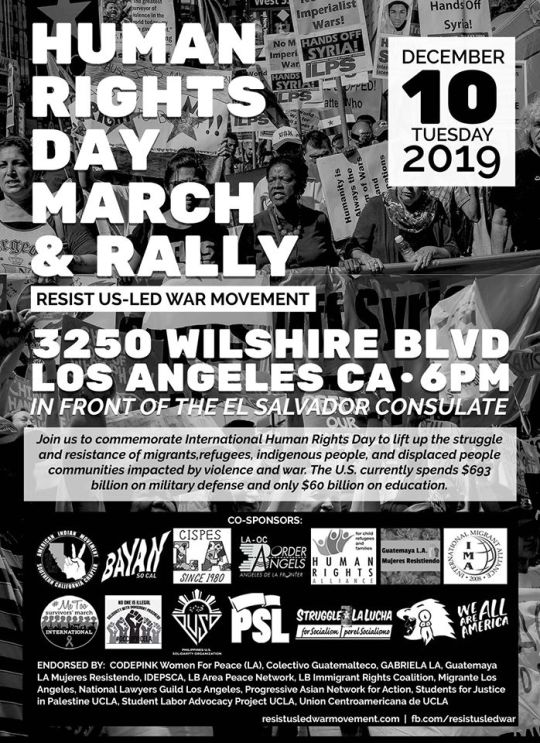
Los Angeles: Human Rights Day March & Rally
Tuesday, December 10 - 6:00 pm to 7:30 pm
Gather at Consulate General of El Salvador, 3450 Wilshire Blvd Suite 250, Los Angeles
On December 10th, progressive organizations in Southern CA will host a march and rally in commemoration of International Human Rights Day to highlight the struggles of migrants, refugees, indigenous people, and displaced communities impacted by state violence and war. The U.S. currently spends $717 billion on military defense and only $60 billion on education. We are coming together to build a movement to Resist US-led War & Militarism and we want to invite you to participate in this year’s activity.
Our Demands*
- End U.S. Militarism at home and abroad!
- Defund DHS (US Department of Homeland Security)!
- Divest from Boeing and other military contractors!
- Stop military recruitment of students and youth!
- Redirect funds for housing, jobs, and education!
What: Human Rights Day March & Rally
When: December 10th, 2019 - Tuesday at 6:00PM starting at Consulate of El Salvador marching with a few stops. Total Distance is about 1 mile.
To get involved, please contact us as soon as possible and fill out this form https://tinyurl.com/D10-2019.
For more info: www.resistusledwarmovement.com
#HumanRightsDayLA #ResistUSledWar #BuildJustPeace
Co-sponsored by:
AIM SoCal - American Indian Movement SoCal
BAYAN USA-Southern CA
BORDER ANGELS
CISPES- Los Angeles Chapter - Committee in Solidarity with the People of El Salvador
Human Rights Alliance for Child Refugees & Families
Guatemaya LA Mujeres Resistiendo
International Migrants Alliance - IMA in Southern CA
Me Too Survivors' March International
Occupy Ice L.A.
Party for Socialism and Liberation - PSL LA
PUSO SoCal - Philippine US Solidarity Organization
Struggle - La Lucha for Socialism
Unión del Barrio Los Angeles
We Are All America
Endorsed by:
CODEPINK: Women For Peace (Los Angeles)
Colectivo Guatemalteco
IDEPSCA
Gabriela Los Angeles
Long Beach Area Peace Network
Long Beach Immigrant Rights Coalition
Migrante USA-Los Angeles
National Lawyers Guild Los Angeles
@Progressive Asian Network for Action
Students for Justice in Palestine (SJP) - UCLA
Student Labor Advocacy Project of UCLA
Unión Centroamericana - UNICA de UCLA
_______________
Día de los Derechos Humanos Marcha y Rally (Titular principal)
Resistir el movimiento de guerra liderado por Estados Unidos (subtítulo)
10 de diciembre, 6 p.m.
Frente al Consulado de El Salvador
3250 Wilshire Blvd., Los Ángeles
Únase a nosotros para conmemorar el Día Internacional de los Derechos Humanos para levantar la lucha y la resistencia de los migrantes, refugiados, pueblos indígenas y comunidades desplazadas afectadas por la violencia y la guerra. Estados Unidos actualmente gasta $717 mil millones en defensa militar y solo $ 60 mil millones en educación.
Nuestras demandas
Desfinanciar el Departamento de Seguridad Nacional (DHS)!
¡Fin al militarismo estadounidense en el país y en el extranjero!
¡Alto al reclutamiento militar de estudiantes y jóvenes!
¡Desinvierta de Boeing y otros contratistas militares!
Redireccionar fondos para vivienda, trabajo y educación!
Para más información: www.resistusledwarmovement.com
13 notes
·
View notes
Text
Jewish Americans are at a Turning Point With an “Illegal Regime of Zionist Cunts: Isra-Hell”
I felt alone as a Jew attending a Palestine solidarity rally in 2014. I don’t feel alone any more
— Arielle Angel | Guardian USA | May 22, 2021
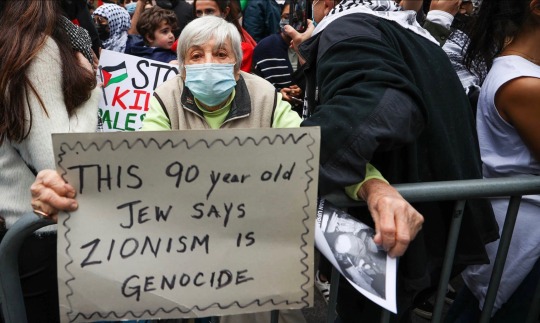
On Nakba Day, 15 May, amid the outbreak of war in Israel/Palestine, I attended a rally in Bay Ridge in Brooklyn, to commemorate the expulsion of more than 700,000 Palestinians from the new Israeli state in 1948, and to protest against the oppression of the Palestinian people in the land between the river and the sea. From the signs I saw as part of that crowd – “This Jew will not stand by” or “Another Jew for a Free Palestine” – and from monitoring my social media feeds, it was clear that there were thousands of Jews taking part in these protests in cities all over the country.
For me, the conspicuous presence of larger numbers of Jews – many, but not all of them young – at every major Nakba Day protest was significant. During the 2014 assault on Gaza, I ventured out to a Palestine solidarity rally in Columbus Circle in Manhattan by myself. An ardent Zionist until that point, my worldview had been profoundly shaken by the images in the papers – Palestinian children bombed to pieces on a beach; Israelis in the rattled buffer town of Sderot gathered on hilltops overlooking the Strip, cheering as the bombs fell.
I didn’t know a single person that might accompany me to such a protest. To go at all felt like a betrayal of everything I’d ever known and loved. And yet even stronger was my anguish at doing nothing. I felt alienated by the march itself, unprepared to face the righteous anger at the Israeli state from the perspective of its victims. My heart raced when chants broke out of “From the river to the sea, Palestine will be free” – a popular protest slogan calling for equality in a single democratic state, which Jews have long been told amounts to their expulsion. I stayed another 30 minutes, then ducked into Central Park, collapsing on a bench in sobs. I’d never felt more alone.
I don’t feel alone any more. Though the years since 2014 have seen the growth of a small but committed Jewish anti-occupation movement, the last week and a half have brought an even larger circle of the community to a place of reckoning. We’ve seen Jewish politicians, celebrities, rabbinical students and others speak up loudly for Palestine. We’ve seen a powerful display of solidarity from Jewish Google employees, asking their company to sever ties with the IDF. At Jewish Currents, the leftwing magazine where I am now editor-in-chief, we asked for questions from readers struggling to understand the recent violence. We’ve been deluged.
These questions taken in aggregate paint a striking portrait of a community at a turning point. Though many queries aim to understand specific aspects of the recent round of violence – the circumstances surrounding the expulsions of Palestinians from their homes in Sheikh Jarrah, for instance, or the affiliations of the Jewish revelers dancing ecstatically opposite a fire on the Temple Mount – many more are simply expressions of confusion, and a newfound willingness to confront it head on.
“These questions taken in aggregate paint a striking portrait of a community at a turning point”
“I know what’s happening is wrong, but does supporting Palestinian liberation mean supporting Hamas?” asks one reader. “How do I talk to my family about this?” asks another. There are people struggling with new terminology (“Is apartheid an accurate word for what is happening in Israel/Palestine? What about ethnic cleansing?”) and with the foundational events that shaped the current situation on the ground (“Was there really an expulsion of Palestinians in 1948?”). Though many of our Jewish readers are anxious about antisemitism and about Jewish safety in Israel, there are strong indications that they are beginning to separate these feelings from the moral reality on the ground. On the whole, their questions represent a genuine outpouring of curiosity and compassion about the plight of Palestinians.
What has changed? The Black Lives Matter movement can claim credit for helping masses of people understand the mechanisms of structural racism and oppression, and for consistently linking the Black struggle to the Palestinian one. White people, including white Jews, who spent last summer confronting their own complicity in anti-Blackness or their discomfort with the force of abolitionist demands like “defund the police”, are perhaps finding themselves prepared to face similar complicities and discomforts in relation to Palestinian liberation. Jewish groups in solidarity with Palestine like Jewish Voice for Peace and IfNotNow in the United States and Na’amod in the UK, some of which were formed following the 2014 assault on Gaza, have steadily moved the intra-communal conversation around Israel/Palestine, creating more space for Jews to speak their conscience without having to abandon their identities. These groups all enjoyed periods of growth during the Trump-era, when Donald Trump’s close relationship with the Israeli prime minister, Benjamin Netanyahu, heightened the contradictions for a largely liberal Jewish populace. Young Jews becoming politically conscious for the first time saw a powerful, rightwing Israel intent on entrenching a decades-long occupation – a story that contrasted sharply with the one many of their elders had told them.
It remains to be seen whether this new visibility of Jewish dissenters on Israel/Palestine will have a meaningful effect on conditions on the ground. Many Jewish communal institutions rely on mega-donors to keep the lights on, and many of those mega-donors are conservative – meaning that our institutions are not particularly responsive to constituent pressure. For another, much of the American support for Israel comes from evangelical Christian Zionists, who, despite stirrings of dissent in their own communities, remain wedded to an apocalyptic Second Coming predicated on a warlike Jewish state. In Israel/Palestine itself, the single most important factor in Palestinian liberation is unified Palestinian resistance, which has taken inspiring new forms this week.
But there’s no question that Jewish support for the status quo in Israel/Palestine provides a powerful justification for Israeli government support globally. More Jews speaking up against Israeli apartheid weakens that justification, leaving politicians, lobbyists and others to account for what their support is really about.
On Thursday, a ceasefire took hold between the Israeli government and Hamas, ending an 11-day engagement that has left 12 Israelis and 232 Palestinians dead. The announcement was a genuine relief, but it does not change the reality in Israel/Palestine, where Palestinians across the land live under various forms of Israeli subjugation – the crushing blockade in Gaza; the military occupation in the West Bank; and second-class status in East Jerusalem and within the Green Line. Just as 2014 produced new infrastructure in the Jewish community to encourage dissent, I am certain that this moment will prove pivotal in a changing Jewish American conversation about Israel/Palestine.
— Arielle Angel is the editor-in-chief of Jewish Currents
0 notes
Text
My Promised Land: Key Takeaways
I read My Promised Land because I knew nothing about the Israel-Palestine conflict and thought that this book would provide an illuminating perspective from the Zionist point of view. When I read the first couple chapters, I was immediately engrossed by the beautiful prose that embodies the spiritual, earthly, and violent identity of Israel. This is not a historical nor a policy book. Shavit wrote this as a book of the people, telling personal anecdotes that convey a greater message about Israel’s contradictions, challenges, and triumphs. Here are my takeaways from the book.
Israel is a home for those who before have never had a home
“Yet as the nineteenth century draws to a close, these Jews realize that as much as they care for Europe, Europe does not care for them. For these newly emancipated European Jews, Europe is like a surrogate mother. They look up to her, they worship her, they give her all they have. Then, suddenly, these devoted sons of Europe notice that Europe won’t have them. Europe thinks they smell. Overnight there is a new, strange look in Mother Europe’s eyes. She is about to go insane. They see the insanity dancing in her eyes, and they understand that they must run for their lives.” (19)
The imagery of the abandoned child frequently reappears throughout the book, constantly reaffirming the surrounding society’s hatred for Jews. “Zionism was an orphans’ movement, a desperate crusade of Europe’s orphans” (33). One does not need to restate the horrifying stories of genocide committed against Jews to capture the palpable loneliness of these people. Under this context, Shavit presents the establishment of a permanent homeland as perhaps the only long-term solution to persecution.
But Shavit does not depict his people as childlike. Rather, he portrays founding Israelites as “almost Bolshevik” (28), utilitarian, disciplined, and masculine. Whereas the US has been blessed by ocean moats that kept foreign invasion at bay for much of its history, Israel is the exact opposite. Existential threat permeates their way of living. Shavit writes, “If Israel had been kindly and compassionate, it would have collapsed. Denial was a life-or-death imperative or the nine-year-old nation into which I was born” (162). Regardless of your political views towards Israel, one cannot but help feel some admiration for their resiliency.
Israel is a country of contradictions
The most glaring contradiction is how Israel conquers a land under the fear of persecution, only to push out tens of thousands of Arabs who had been residing peacefully in this land for years. Shavit tries to wrestle with this contradiction, at times chalking up occupation to naïve ignorance, at other times taking full responsibility for the brutality of its reign. Sometimes, Shavit’s defense feels flimsy. “Is this colonialism? If it looks like a duck and walks like a duck and quacks like a duck, it probably is a duck” (18). But he continues, the first British Zionists “don’t really represent an empire but a deprived people seeking the help of empires. […] I see no evil. I do not see a condescending attempt to take the poor man’s lamb.” Yet, even if these Zionist individuals did not set out as agents of a colonialist power, how could they remain ignorant of an inevitable conflict with Arab locals? Even if Arab nationalism had not yet been fully formed and Palestine was not yet a sovereignty, can Shavit honestly believe that these Zionists were not trespassing on their land?
However, at this point, there has been such a cycle of retributive justice that occupation is no longer a question of righting wrongs. As Shavit writes about the Conquest of Lydda, “War was inhuman, but it allowed one to do what one could not do in peace; it could solve problems that were unsolvable in peace” (118). Whereas Shavit suggests that early settlers of Israel were able to overlook their Arab neighbors, Shavit recognizes that contemporaries can no longer ignore this fundamental contradiction of Israel. This is a contradiction that must be acknowledged and reconciled at a personal level.
In his attempt to reconcile the atrocities that Israel has committed with the mission that Shavit believes in, he writes, “On the contrary. If need be, I’ll stand by the damned. Because I know that if it wasn’t for them, the State of Israel would not have been born. If it wasn’t for them, I would not have been born. They did the dirty, filthy work that enables my people, myself, my daughter, and my sons to live” (131).
Shavit is not blind to how contemporary Israel treats Palestine. He writes, “For its outstanding economic, social, and engineering achievements, the new Israel paid a dear moral price. There was no notion of human rights, civil rights, due process, or laissez-faire. There was no equality for the Palestinian minority and no compassion for the Palestinian refugees” (151). While fulfilling officer duties at the Gaza Beach Detention Camp, Shavit reflects on his complicity in repressing Palestinian rights: “They scream because my Jewish state makes them scream. In a methodical, orderly, and absolutely legal fashion, my beloved democratic Israel makes them scream” (232). Do democracies only act as democracies until it becomes inconvenient to do so?
Shavit also recognizes that the political tides have turned; the international community now views Israel as the occupier rather than the occupied. It is a Middle East super power with developed nuclear weapons, a booming economy, and a vibrant startup scene. But this country has been receding politically over the past few decades. After the humiliating Yom Kippur Wars, “Suddenly the government of Israel was willing to give up everything. […] there was cynicism, nihilism, defeatism” (207).
Yet as Israel progresses as a nation-state, Shavit recognizes that future generations have become more distant from the political context for the country’s origination story. They have become degrees removed from the Holocaust. Perhaps it is inevitable for every future generation to become lazier and more disillusioned than the prior. They are not as willing to tolerate mandatory conscription or occupation of Palestine. Jews abroad, particularly in America, feel even more distant from their heritage. The question thus arises of how far are millennials willing to go for the Zionist mission.
Israel is a country rooted in the land
Shavit digs his fingers in every nook and cranny of Israel’s terrain to pay homage to the land and fruits it has born to its people. Shavit focuses Israel’s origination story on the barren harsh land that must be conquered only through sheer labor and will power. “Face to face with the elements, face to face with brutal existence, no protection at all. And here, in this desolate valley, we must sculpt our lives. From these rocks we must carve our new foundation” (33). Shavit glorifies the cultivated gardens, the plots of orange groves, and olive oil estates. After all, it is these cherished orange trees that gave rise to Israel’s dominance in citrus export. It is these individual remote farms that sowed Israel’s astronomical rise from the isolated to expansionist power. It is in the idyllic terrain where both Jewish and Palestinian terrorists hid automatic rifles in orange crates as they faced the inevitable conflict. But the earth doesn’t just provide sustenance for Israelites. They represent the uprooting of history, the conquering of the land. In one olive tree nursery, “Jewish workers rallied one day and uprooted the olive trees planted by Arab workers, replanting them with their own hands in order to make a national Jewish statement” (100). Even manual laborers are deeply consciousness of the Zionist mission.
I remain fascinated and intrigued by Israel, and would love to read perspectives from opposing points of views regarding the Israel-Palestine issue. For now, I have begun another book, Jerusalem: The Biography, to deepen my understanding of the underlying religious issues and history of this region. Israel remains one of the most fascinating trips that I’ve taken to date, and I would love to go back whenever this pandemic is over now that I have a greater appreciation for its culture and history.
0 notes
Text
WION Morning News brief, 30 December 2017
India slams the presence of Palestinian envoy at Hafiz Saeed's rally in Pakistan
After it emerged that the Palestinian envoy was present at Mumbai terror attacks mastermind and Lashkar-e-Toiba (LeT) co-founder Hafiz Saeed's rally in Pakistan, India slammed Palestine. Ministry of External Affairs (MEA) official spokesperson Raveesh Kumar in a statement said that they were taking up the matter with the Palestinian authorities.
IS claims Egypt church attack
A gunman opened fire on a church south of Cairo on Friday, killing at least nine people in the latest apparent jihadist attack on Egypt's Christian minority. The Islamic State group claimed its "soldiers" carried out the attack on the Saint Mina Coptic church in the district of Helwan, just south of Cairo.
Uttar Pradesh: Madrasa manager arrested for allegedly molesting girls
A manager of a madrasa in Shahadatganj, Uttar Pradesh was arrested on Friday for allegedly sexually exploiting girls. The girls were rescued in raids conducted at the madrasa on Friday night, ANI reported. Fifty-one girls were present at the madrasa when the raids occurred and have accused the manager of molesting them.
Gunman dead after multiple people shot at Long Beach business: Report
The Los Angeles Times reported that multiple people were shot at a business in Long Beach, California Friday (December 29).The Los Angeles Times reported that authorities said the gunman is "believed to be deceased at the scene."
Delhi fog: 36 trains to arrive late, 13 cancelled
Fog enveloped Delhi on Saturday. Thirty-six trains will arrive late, two have been rescheduled and 13 cancelled due to low visibility or operational reasons
]]>
0 notes
Text
Opinion // Donald Trump Wants to Revoke My Citizenship. Because I'm an Arab
Trump’s Mideast plan pushes the hard right dream of population transfer: the involuntary revocation of Israeli citizenship for 300,000 people. We, the Arab minority, had no say
— Dr. Anwar Mhajne | Haaretz | February 12, 2020
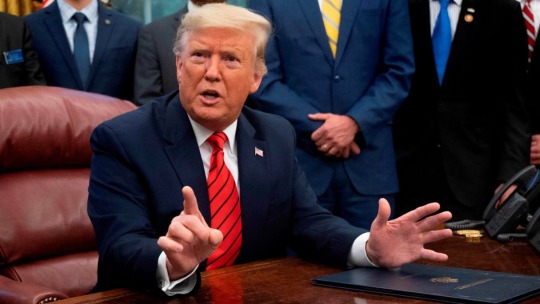
'The White House endorses revoking the citizenship of 300,000 inhabitants of Israel's Arab communities': US President Donald Trump in the Oval Office of the White House, Feb 11, 2020
President Donald Trump wants to revoke my citizenship. Because I am an Arab.
No, not in the United States, but in Israel. His Mideast "Deal of the Century" endorses an exchange: Multiple Arab towns in northern Israel would come under the writ of a future Palestinian state, and in exchange, Israel would annex Jewish settlements situated in the Palestinian territories.
This dry description doesn’t do the idea justice. This is what it really is: A population transfer conducted without any consultation with the people affected. A policy position based on ignorance about the complex layers of identity of Arab citizens of Israel, already targets of incitement and racism by Israel’s right-wing. And a legitimation of the hard right aspiration towards an homogenously Jewish Israel, where minorities are conditional guests and whose citizenship is not equal in origin or rights.
Those Arab towns are situated in what is known as the "Triangle," a region with an Arab majority bordering the northwest corner of the West Bank. For the Israeli establishment, that Arab population is a demographic threat to the Jewish nature of the Israeli state, together with general anxieties about the high birth rate among Arab families in Israel and Palestine.
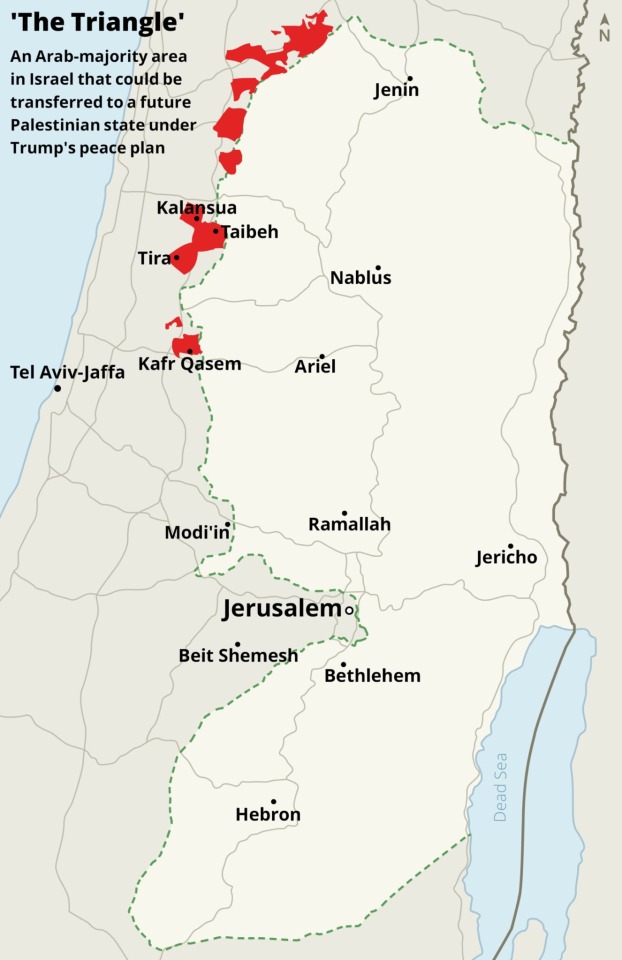
The Trump plan "contemplates the possibility, subject to agreement of the parties that the borders of Israel will be redrawn such that the Triangle Communities become part of the State of Palestine…the civil rights of the residents...would be subject to the applicable laws and judicial rulings of the relevant authorities."
The plan "explains" that, since the security concerns prompting Israel to acquire these Arab communities in 1949 have since been resolved, these communities could now be passed on to a future Palestinian state. "These communities, which largely self-identify as Palestinian, were originally designated to fall under Jordanian control during the negotiations of the Armistice Line of 1949, but ultimately were retained by Israel for military reasons that have since been mitigated."
The White House is giving a rationale for revoking the Israeli citizenship of the 300,000 inhabitants in these communities - myself included. Who would decide the fate of these communities? There is no mechanism mentioned to gauge grassroots Arab opinion. Would there be a localized referendum? Or would it be left to the Israeli and U.S. administrations to "benevolently" decide the fate and citizenship status of a quarter of a million citizens of Israel?
Removing our agency is only one aspect of Trump’s plan. Another is the superficial and ignorant foundations on which the "analysis" the Arab communities in Israel are based, not least, the blanket statement that we "largely self-identify as Palestinian."
We, the Arab citizens of Israel, are the Palestinians who remained under Israeli rule after the 1948 Arab-Israeli War. We represent about 21 percent of the entire Israeli population. Generally, our national, cultural, and civic identities coexist separately. Our Palestinian identity is foremost in relation to ideological, cultural, and religious issues; our Israeli identity is tied to our civic status, political engagement, work, and education. Arab citizens have historically operated within the Israeli political system to address their issues and concerns.
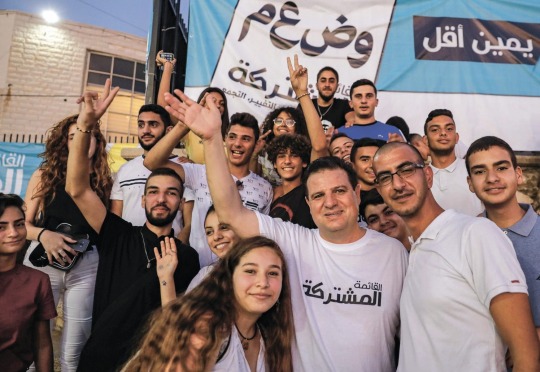
Ayman Odeh poses with supporters during a campaign rally for the Joint List in the Arab town of Kafr Yasif in northern Israel, August 23, 2019.
And contradicting the Trump plan’s claim, recent polls show that more members of these communities now self-identify as Arab, or Arab Israeli, rather than Palestinian.
The idea of revoking the citizenship of thousands of Arab citizens is not new, but rather a continuation of Israel’s discriminatory and alienating policies, and of right-wing incitement against the community. Those policies include the Jewish Nation-State Law, which practically and symbolically institutionalized the primacy of Jewish Israelis and the Hebrew language. Since 1948, we, the Arab minority, have been targeted by unfair laws, budgeting and planning, land confiscations, surveillance and political suppression.
Benjamin Netanyahu and his associates have a long history of inciting mistrust against Arab citizens and their representatives. The prime minister has frequently and groundlessly labelled Arab Knesset members as terrorists and collaborators to galvanize his right-wing base.
And this isn’t the first time that Israel’s right-wing has mooted the idea of a land and population swap. In 2014, serving as foreign minister, Avigdor Lieberman, the head of Yisrael Beitenu Party, promoted a plan to transfer various Israeli Arab towns to the jurisdiction of a future Palestinian state, a riff on a theme he'd already been pushing for a decade. In 2017, Netanyahu repeated that proposal in front of Trump’s senior advisor Jared Kushner and Mideast envoy Jason Greenblatt- two key architects of the Trump peace plan.
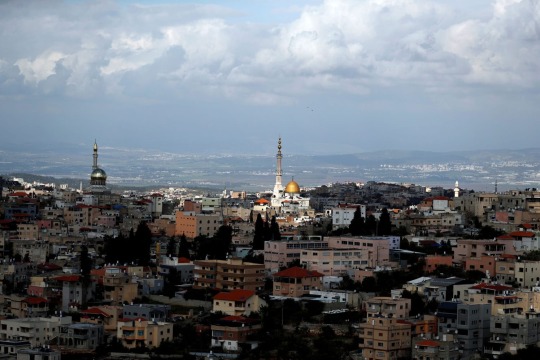
The Arab-Israeli city of Umm al-Fahm in the foreground and Wadi Ara in the background, Israel January 30, 2020.
As Israel prepares for a third round of national elections, incitement against the Arab community in Israel is spiking again. Both the Likud’s Netanyahu and former military chief and Kachol Lavan head Benny Gantz have serially failed to secure the 61-seat threshold needed for a governing coalition.
Simultaneously, Arab voters and their representatives have been thrust into the center of the national political debate, with the electoral strength of the Joint List (an alliance of four parties: Hadash, Taal, Balad, and the United Arab List) as a potential kingmaker and third major party – predicted to win 13-14 seats in the 120 seat Knesset.
Cue the pushback and the incitement. At an "emergency rally" held by the Likud in November 2019, Netanyahu declared that a Gantz minority government formed with the help of the Joint List "is an existential threat to the State of Israel…they will celebrate in Tehran, Ramallah and Gaza the way they celebrate after every terror attack. This would be a historic national terror attack on the State of Israel." By portraying Arabs as traitors and supporters of terrorism, Netanyahu delegitimizes any political alliance in which the Joint List has a voice.
He continued in the same vein: "To be dependent on them all the time, especially at the current time, is an enormous danger to Israel and a breach of a kind never seen before in the history of the country."
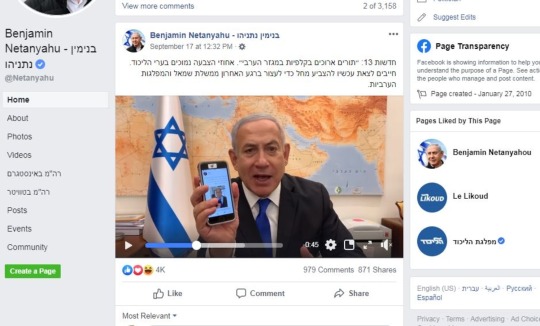
A Netanyahu 'emergency appeal' on Facebook on election day, Sept 17 2019: 'Long queues at Arab polling stations…You must go vote Likud to stop a last-minute leftist-Arab government'Facebook
Arabs in Israel and their leadership have expressed their hostility to the peace plan and all its provisions. They reacted to the idea of being "transferred" out of Israel with anger, doubt and sarcasm. Some labeled it as racist and dangerous – and a transparently expedient attempt to help shore up Netanyahu’s flailing political fortunes.
Dr. Samir Sobhi, mayor of Umm al-Fahm, one of the towns referenced in the Trump plan, responded to the "deal of the century" by affirming the wall-to-wall Palestinian consensus to reject the deal, and further noted that Arabs in Israel refuse to become an "electoral card" in the hands of clandestine deal-making by Netanyahu and Trump. Leaders of the Arab community are actively devising a plan to combat the Triangle transfer proposal.
Arab citizens in Israel and their leaders also have had to contend with hostile questioning about why they oppose the idea of transfer swap if they identify with the Palestinian cause. That, again, is a tendentious reading of our identities. And the repercussions of any such plan go far beyond the issues of identity and ideology, to the very fabric of our lives, and our human rights.
Would we need permits to access the beaches of Haifa and the Dead Sea, places we grew up visiting? How would we maintain our close connections to family members living further within Israel’s 1967 borders? Many of us study and work in cities such as Tel Aviv. What will happen to our jobs and education? The plan foresees a Palestinian state still subject to various forms of Israeli control. So would Israel enforce military rule in our now-Palestinian cities, like it did over Arab villages within Israel from 1948-1966?
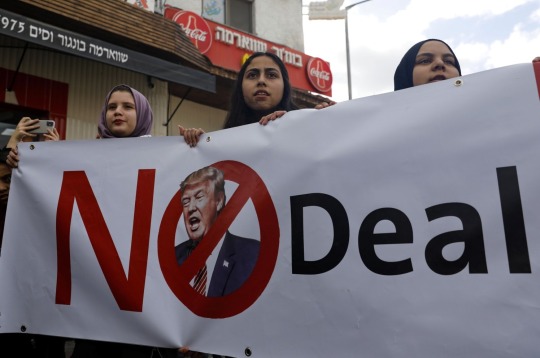
Arab Israelis protest Trump’s Mideast peace deal in the Arab-Israeli town of Baqa al-Gharbiya, northern Israel. February 1, 2020.
I suspect that any forced implementation of this plan would be experienced as another Nakba, a radical disconnection from our access and connection to our land once again.
Trump's Mideast plan is profoundly unAmerican, and against American traditions of democracy and individual rights: it would require accepting Israel’s revocation of the citizenship of thousands of its citizens without consulting them, and the targeting of a group of people for their ethnic and religious identity.
And it would risk violating those international laws concerned with the revocation of citizenship. Article 15(2) of the Universal Declaration of Human Rights rules that "No one shall be arbitrarily deprived of his nationality nor denied the right to change his nationality."
Trump’s peace plan threatens the status of Israel’s Arab population, and fuels right-wing detractors whose delegitimization of equality now has the imprimatur of the president of the United States. But it also opens up a bigger set of queries: Who is worthy of full citizenship and protection under the law?
Both the United States and Israel claim democracy to be an identifying trait and distinguishing set of values. But by marketing a plan that attempts to strip people from their citizenship, it seems that those governing the two countries are comfortable with limiting the basic rights of citizens, granting them only to a select group of people along ethnic and religious lines.This doesn’t sound like democracy to me.
Dr. Anwar Mhajne, a native of Umm Al Fahm, is Assistant Professor in the Department of Political Science at Stonehill College, MA. Twitter: @mhajneam
0 notes